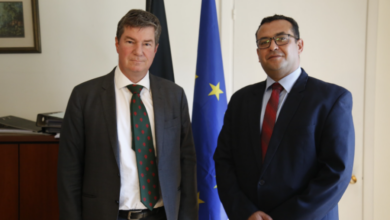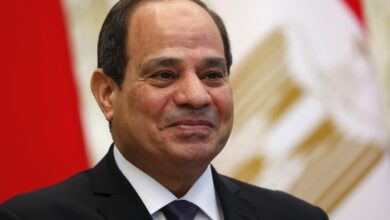While the uprisings in the Arab world have scarcely left the television screens of global audiences in recent weeks, a new exhibition of film at the Tate Modern in London throughout March provides a very different view of life and art in this much talked about region.
Mapping Subjectivity: Experimentation in Arab Cinema from the 1960s to Now is a selection of personal and innovative films from across the Arab world (including contributions from Algeria, Egypt, Iraq, Lebanon, Morocco, Palestine and Syria) that gives an alternative insight into the creative and inventive worlds of independent art in the region.
“So many discussions on the Arab world in the West are fairly ignorant of broader cultural developments and internal conversations. There are all kinds of gaps,” said Stuart Comer, Curator of Film at the Tate Modern. “I’m hoping this can help to build a different kind of conversation.”
This exhibition comes from the Museum of Modern Art (MoMA) in New York, where it was first shown in 2010, and Arte East, a US-based non-profit organization, whose mission is to bring Arab art and culture to broader audiences. Its curators have spent three years researching, unearthing and in some cases restoring films for the program. The hope is to reach diverse audiences across the globe, from Brazil to the Netherlands, through screenings at prestigious large-scale venues such as MoMA and the Tate to small independent cinemas and universities.
Shadi Abdel-Salam’s seminal works “The Eloquent Peasant” (Egypt, 1970) and “The Mummy” (Egypt, 1970), restored by the World Cinema Foundation, are examples of classic and influential avant-garde cinema featured in this program that would otherwise be near-impossible to get hold. Restoration is no small undertaking, and can cost anything from US$10,000 to a US$1 million, according to director of Arte East, Livia Alexander, who estimates that “The Mummy” sits “probably towards the higher end” of this scale. The the results, however, are “mind-blowing”, as the restored version is so much improved that it “is a completely different experience” from the original.
“Summer 70” (Egypt/Italy, 1970-71) is less well known and one of the more experimental pieces, with very little narrative and a non-linear structure pulled together by a striking sound track. It is another restored 1970s film, this time by Arte East as part of their initiative to digitize and make available cinema that falls outside the mainstream. Copies of the films will be preserved and placed in MoMA’s archive.
Although the program aims to bring long-forgotten or rare films to a wider audience, it is about more than showcasing obscure cinema; indeed, some of the films are well-known, like Elia Suliaman’s “Divine Intervention“ (Palestine, 2002). As is made clear in the title, “Mapping Subjectivity” is about alternative representations. It focuses on subjectivity, conjuring up a mix of highly-personal voices that have created daring and unconventional narratives.
Comer explains that these films are “taking a broader history of the Arab world and making it their own, locating particular individuals who communicate very distinct stories so that it becomes less of a generalized narrative.” This is particularly pertinent for Western audiences, “where we do think about the Arab world more in terms of media images that are broadcast to us rather than Arab cinema, especially this kind of cinema, which is not official and not necessarily coming from within the industry.”
Ghassan Salhab’s two films, “1958” (Lebanon/France, 2009) and “Phantom Beirut” (Lebanon, 1998), both chart personal and intimate reflections on Lebanese conflict, but in different ways. “1958” mixes personal interviews, with the director’s mother, for example, to tell Salhab’s story as well as that of Lebanon’s. “Phantom Beirut” tells the story of a man returning to late-1980s Beirut and the impact this has on his friends and relatives, with war as a backdrop. The story is then interspersed with interviews with the actors about their own memories of the war, adding another layer of personal recollection and subjectivity.
One of the most intriguing aspects of this diverse retrospective of Arab cinema is how this experimental scene, rooted in the 1960s, connects to independent filmmaking today and to the rest of the world.
“We tend to think of Arab cinema as very isolated, but in fact, if we think about the intellectual world of the 1960s there was actually a great deal of fluidity and exchange and influence in all directions,” said Alexander, who also holds a PhD in Arab cinema, and points to links with movements such as Cinema Novo in Brazil. Many of these films have an influential role to play in experimental and avant-garde film today, and while this program is “looking at these films from the 1960s and making them available, it is also making these links between earlier traditions and more contemporary traditions. It's making connections between audiences with cinema that was previously unavailable, but also between the past and the present,” added Alexander.
Building on this idea of a continuing tradition of Arab avant-garde art, Mapping Subjectivity’s curators are taking it to the Arab world, where it will not only reach broader audiences but may also inspire new generations of independent filmmakers.




